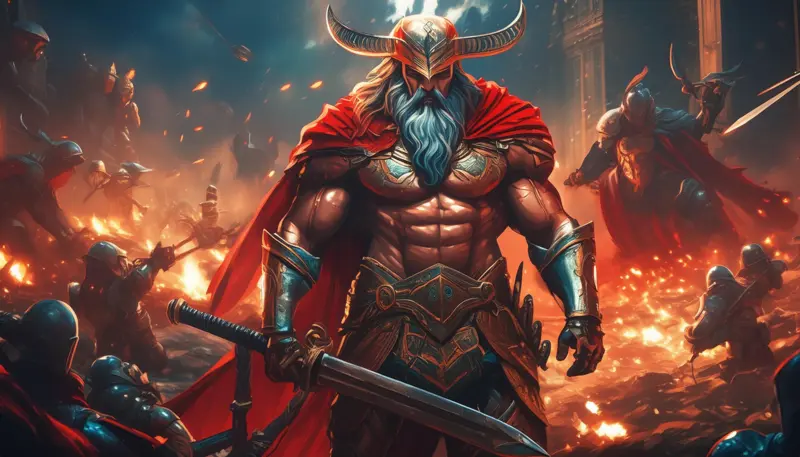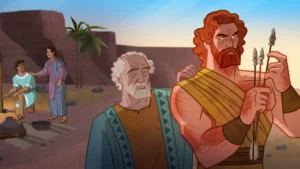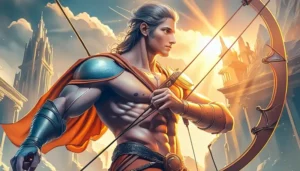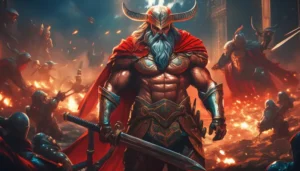Who is Ares?
Ares, in Greek mythology, is the god of war. But he’s not the god of strategic warfare or honorable combat like Athena. Ares embodies the raw, visceral aspects of conflict: bloodshed, violence, and the chaos of battle.
Ares’ Family Tree
- Parents: Zeus (king of the gods) and Hera (queen of the gods)
- Siblings: Eileithyia (goddess of childbirth), Hebe (goddess of youth), Hephaestus (god of fire and craftsmanship)
- Consorts: Aphrodite (goddess of love and beauty) is his most famous lover, though he had numerous others.
- Children: He had many children, including Phobos (fear) and Deimos (terror), who accompanied him into battle.
Ares’ Domains
- War: The destructive force of war, not its tactical side.
- Violence: The brutal, unrestrained aspect of conflict.
- Bloodshed: The grim reality of battle and the loss of life.
Ares’ Symbolism
- Weapons: Spear, sword, shield, and helmet
- Animals: Dog, vulture, and boar (animals associated with aggression and carnage)
- Chariot: Often depicted riding a chariot pulled by fiery horses
Ares in Ancient Greek Culture
Ares wasn’t a widely worshipped god in Greece. While his power was acknowledged, his destructive nature made him feared rather than loved. His temples were few, and his festivals were not as celebrated as those of other Olympians.
The Duality of Ares
Despite his fearsome reputation, he also represents courage and the warrior spirit. He embodies the necessary force to overcome obstacles and fight for what one believes in.
In Myth and Legend
Ares’ Tumultuous Affairs
Despite his destructive nature, he was not without his charms. His most famous lover was Aphrodite, the goddess of love and beauty. Their affair was passionate but tumultuous, resulting in several children, including Harmonia (goddess of harmony) and the twins Phobos and Deimos.
Ares’ Conflicts
He often found himself at odds with other gods. He had a fierce rivalry with Athena, goddess of wisdom and strategic warfare. Their different approaches to conflict led to numerous clashes. He also faced the wrath of Hephaestus, Aphrodite’s husband, who caught them in a compromising position and publicly humiliated them.
Ares and the Trojan War
Ares played a significant role in the Trojan War, siding with the Trojans. He fought alongside Hector and other Trojan heroes, showcasing his ferocity and bloodlust. However, he was wounded by the Greek hero Diomedes with the help of Athena, a humiliating defeat for the god of war.
Ares and the Amazons
He was closely associated with the Amazons, a tribe of fierce warrior women. He was believed to be their patron and the father of their queen, Hippolyta. The Amazons embodied the warrior spirit that Ares represented.
His Legacy in Modern Culture
His influence extends beyond ancient mythology. He has appeared in numerous works of literature, art, and film. He is often depicted as a powerful but flawed figure, representing the darker aspects of human nature.
Ares: Temples, Worship, and Enduring Symbolism
Temples and Worship of Ares
While he was not as widely worshipped as some other Greek deities, he did have temples dedicated to him in various parts of Greece. These temples were often located in areas associated with warfare or military training.
- Athens: The Areopagus, a hill in Athens, was named after him. It was a site of political and judicial importance, as well as a place where sacrifices were made to the god of war.
- Sparta: The Spartans, known for their warrior culture, held Ares in high regard. They built a temple dedicated to him and invoked his favor before going into battle.
- Thrace: This region, known for its fierce warriors, was considered the homeland of Ares. It was believed that he resided on Mount Haemus in Thrace.
Ares in Roman Mythology
In Roman mythology, he was equated with Mars, the Roman god of war. However, Mars held a more prominent position in Roman society, as he was considered the protector of Rome and the father of Romulus and Remus, the legendary founders of the city.
Ares’ Enduring Symbolism
The symbolism associated with god continues to resonate in modern times. He represents:
- The Warrior Spirit: The courage, determination, and strength needed to face challenges and overcome obstacles.
- The Shadow Side: The darker aspects of human nature, such as aggression, violence, and the destructive impulses that can lead to conflict.
- The Power of Transformation: The ability to channel negative emotions into positive action and use conflict as a catalyst for growth and change.
Ares in Popular Culture
The god has appeared in numerous works of fiction, film, and television. He is often depicted as a complex and conflicted figure, grappling with his own destructive tendencies. His portrayal in popular culture reflects the enduring fascination with the god of war and his enduring symbolism.
Conclusion: The Legacy of Ares
Ares, the Greek god of war, remains a compelling figure in mythology and popular culture. He embodies the duality of human nature, representing both the destructive power of conflict and the warrior spirit that drives us to overcome challenges. His legacy continues to inspire and intrigue, reminding us of the complex and often contradictory nature of human existence.









